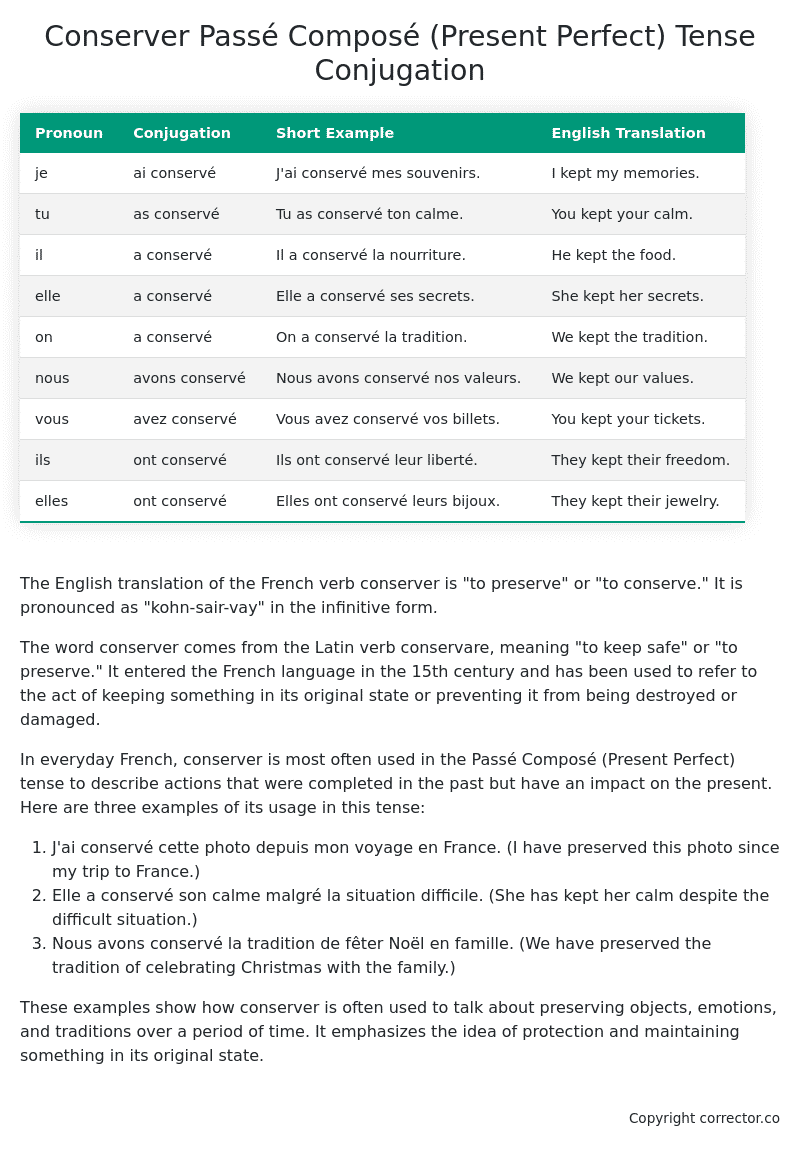Passé Composé (Present Perfect) Tense Conjugation of the French Verb conserver
Introduction to the verb conserver
The English translation of the French verb conserver is “to preserve” or “to conserve.” It is pronounced as “kohn-sair-vay” in the infinitive form.
The word conserver comes from the Latin verb conservare, meaning “to keep safe” or “to preserve.” It entered the French language in the 15th century and has been used to refer to the act of keeping something in its original state or preventing it from being destroyed or damaged.
In everyday French, conserver is most often used in the Passé Composé (Present Perfect) tense to describe actions that were completed in the past but have an impact on the present. Here are three examples of its usage in this tense:
- J’ai conservé cette photo depuis mon voyage en France. (I have preserved this photo since my trip to France.)
- Elle a conservé son calme malgré la situation difficile. (She has kept her calm despite the difficult situation.)
- Nous avons conservé la tradition de fêter Noël en famille. (We have preserved the tradition of celebrating Christmas with the family.)
These examples show how conserver is often used to talk about preserving objects, emotions, and traditions over a period of time. It emphasizes the idea of protection and maintaining something in its original state.
Table of the Passé Composé (Present Perfect) Tense Conjugation of conserver
| Pronoun | Conjugation | Short Example | English Translation |
|---|---|---|---|
| je | ai conservé | J’ai conservé mes souvenirs. | I kept my memories. |
| tu | as conservé | Tu as conservé ton calme. | You kept your calm. |
| il | a conservé | Il a conservé la nourriture. | He kept the food. |
| elle | a conservé | Elle a conservé ses secrets. | She kept her secrets. |
| on | a conservé | On a conservé la tradition. | We kept the tradition. |
| nous | avons conservé | Nous avons conservé nos valeurs. | We kept our values. |
| vous | avez conservé | Vous avez conservé vos billets. | You kept your tickets. |
| ils | ont conservé | Ils ont conservé leur liberté. | They kept their freedom. |
| elles | ont conservé | Elles ont conservé leurs bijoux. | They kept their jewelry. |
Other Conjugations for Conserver.
Le Present (Present Tense) Conjugation of the French Verb conserver
Imparfait (Imperfect) Tense Conjugation of the French Verb conserver
Passé Simple (Simple Past) Tense Conjugation of the French Verb conserver
Passé Composé (Present Perfect) Tense Conjugation of the French Verb conserver (this article)
Futur Simple (Simple Future) Tense Conjugation of the French Verb conserver
Futur Proche (Near Future) Tense Conjugation of the French Verb conserver
Plus-que-parfait (Pluperfect) Tense Conjugation of the French Verb conserver
Passé Antérieur (Past Anterior) Tense Conjugation of the French Verb conserver
Futur Antérieur (Future Anterior) Tense Conjugation of the French Verb conserver
Subjonctif Présent (Subjunctive Present) Tense Conjugation of the French Verb conserver
Subjonctif Passé (Subjunctive Past) Tense Conjugation of the French Verb conserver
Subjonctif Imparfait (Subjunctive Imperfect) Tense Conjugation of the French Verb conserver
Subjonctif Plus-que-parfait (Subjunctive Pluperfect) Tense Conjugation of the French Verb conserver
Conditionnel Présent (Conditional Present) Tense Conjugation of the French Verb conserver
Conditionnel Passé (Conditional Past) Tense Conjugation of the French Verb conserver
L’impératif Présent (Imperative Present) Tense Conjugation of the French Verb conserver
L’infinitif Présent (Infinitive Present) Tense Conjugation of the French Verb conserver
Struggling with French verbs or the language in general? Why not use our free French Grammar Checker – no registration required!
Get a FREE Download Study Sheet of this Conjugation 🔥
Simply right click the image below, click “save image” and get your free reference for the conserver present perfect tense conjugation!

Conserver – About the French Passé Composé (Present Perfect) Tense
Formation of the Passé Composé
Set the auxiliary verb with either
Conjugate the auxiliary verb
Add the past participle
Common everyday usage patterns
Narrating Past Events
Sequential Actions
Describing Completed Actions
Interactions with other tenses
Imperfect Tense
Conditional and Future Tenses
Summary
I hope you enjoyed this article on the verb conserver. Still in a learning mood? Check out another TOTALLY random French verb conjugation!


